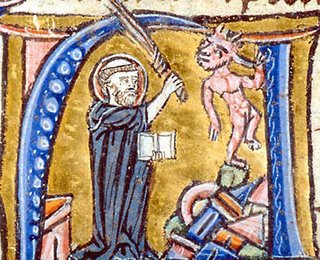
Among contemporary Christian authors Wayne Grudem has been at the forefront in dealing with theological errors that are being welcomed as acceptable, even preferred, options for evangelicals to believe.
In doing so he has sounded a note that is rarely heard today. Rather than merely analyse the human dimension of error he raises the issue of the purpose of false theologies in God's providential dealing with his people.
Consider the following from his recent book
Evangelical Feminism: A New Path To Liberalism? Speaking of the use of the argument from experience to justify women fulfilling the same role as men as elders, pastors and teachers he says:
"This gives us an opportunity to decide whether we will follow God's Word or allow ourselves to be led away fom his Word by experiences that seem to bring blessing to people. Though not everyone will agree with me at this point, I believe this is a test of our faithfulness to God and to his Word in our generation. Eventually the consequences of each decision will become plain."Grudem p. 129
The text that I think he is alluding to here, and which he cites in his excellent chapter in
Beyond the Bounds, is Deuteronomy 13. Here is verse four of that chapter,
"For the LORD your God is testing you, to know whether you love the LORD your God with all your heart and with all your soul."The context is an admonition to the people to resist the turn to idolatry by following the lead of false prophets. Life would be easy if idols always had different names from that of the true God. But that is not always the case. Consider John's closing command in his first epistle to
"keep yourselves from idols." Unless that verse is totally unconnected to the content of the letter, which I very much doubt, then the idolatry John has in mind is the belief in an idol called "Jesus" whom the false prophets are proclaiming. Then there is the "Jesus" of the super-apostles in Corinth who is "another Jesus" than the one that Paul proclaimed. And from the Old Testament we have the prophet Hananiah delivering the Word of "Yahweh" (Jeremiah 28). But the "Yahweh" he speaks for is not the true one but an idol of the mind.
Spotting deception is not easy, but unless it is spotted it will lead to great damage to the Church. As strange as it may seem, we can be led astray from the Lord by the claims of teachers who are insistent on their faithfulness to the Word of the Lord.
Why does God allow this? To see if we love him with our heart and soul.
When you think of heresies ancient and modern, obvious and exposed, subtle and concealed, ask yourself
"what is God teaching his Church through this?". And then ask,
"how can I respond to this distressing problem in a way that will bring honour and glory to the Father, Son and Holy Spirit?" And see if the answer to each question
does not involve your love, trust and submission to the apostolic gospel and authority of the Bible. I'm sure that it will.
And then pray:
"O Lord my God please look upon me in mercy and grace, please keep me from the sin of idolatry.
O Lord, grant that I would always be satisfied with your truth, and grant me always a submissive spirit to humbly bow to your Word whatever the cost.
Keep me from the wilful pride that would place your Word beneath the authority of my own thoughts and wisdom. Lord in your perfect and infinite wisdom you have permitted your Church to be in danger of deception to test the hearts of your people to see if they love you.
Keep me O Lord from abandoning your gospel, and from turning aside to that which is no gospel at all.
And may your Church submit to the teaching of your Word and not to the thoughts of men, the ways of the world, or the dressed up lies of the evil one. For the sake of the glory of your Son, without the true knowledge of whom no man may know you. Amen."
 There is nothing that men will not pervert. The very words of God, inscripturated for us, can be twisted, distorted and altered to give new meanings (2 Peter 3:16). They are the same words but with a totally new content. That is what makes heresy so insidious.
There is nothing that men will not pervert. The very words of God, inscripturated for us, can be twisted, distorted and altered to give new meanings (2 Peter 3:16). They are the same words but with a totally new content. That is what makes heresy so insidious.



